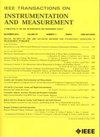利用 FMCW 雷达传感器进行基于头部方向估计的凝视跟踪
IF 5.6
2区 工程技术
Q1 ENGINEERING, ELECTRICAL & ELECTRONIC
IEEE Transactions on Instrumentation and Measurement
Pub Date : 2024-10-18
DOI:10.1109/TIM.2024.3472779
引用次数: 0
摘要
在本文中,我们提出了一种基于头部方位估计的眼球跟踪方法,该方法使用单个 60 GHz 调频连续波(FMCW)雷达传感器。FMCW 雷达数据是在雷达照射面部正面或侧面的情况下获取的。由于当人注视雷达时,眨眼引起的面部肌肉变化更为明显,因此可以通过分析接收到的雷达信号来估计人的头部方向。首先,生成近似的测距-角度图,以确定是否有人类存在。当检测到人时,接收到的信号会被投射到感兴趣的低子空间上。随后,对投射信号采用超分辨率算法,以获得精确的目标频谱。累积的频谱图作为 MobileNet 的输入,用于对与人类头部不同方向相对应的雷达信号图像进行分类。分类结果表明,所提出的方法可以识别人头的方向,准确率超过 90%。本文章由计算机程序翻译,如有差异,请以英文原文为准。
Eye-Gaze Tracking Based on Head Orientation Estimation Using FMCW Radar Sensor
In this article, we propose an eye-gaze tracking method based on head orientation estimation that uses a single 60-GHz frequency-modulated continuous-wave (FMCW) radar sensor. The FMCW radar data are acquired for cases, in which the radar is illuminating the front or side of the face. Because the variation in facial muscles caused by eye blinking is more pronounced when a human gazes at the radar, the orientation of the human head can be estimated by analyzing the received radar signal. First, an approximate range-angle map is generated to identify whether a human exists. When a human is detected, the received signal is projected onto the lower subspace of interest. Subsequently, a super-resolution algorithm is applied to the projected signal to obtain a precise target spectrum. The accumulated spectrogram is used as input to MobileNet to classify radar signal images corresponding to different orientations of the human head. The classification results show that the proposed method can identify the orientation of a human head with an accuracy exceeding 90%.
求助全文
通过发布文献求助,成功后即可免费获取论文全文。
去求助
来源期刊

IEEE Transactions on Instrumentation and Measurement
工程技术-工程:电子与电气
CiteScore
9.00
自引率
23.20%
发文量
1294
审稿时长
3.9 months
期刊介绍:
Papers are sought that address innovative solutions to the development and use of electrical and electronic instruments and equipment to measure, monitor and/or record physical phenomena for the purpose of advancing measurement science, methods, functionality and applications. The scope of these papers may encompass: (1) theory, methodology, and practice of measurement; (2) design, development and evaluation of instrumentation and measurement systems and components used in generating, acquiring, conditioning and processing signals; (3) analysis, representation, display, and preservation of the information obtained from a set of measurements; and (4) scientific and technical support to establishment and maintenance of technical standards in the field of Instrumentation and Measurement.
 求助内容:
求助内容: 应助结果提醒方式:
应助结果提醒方式:


